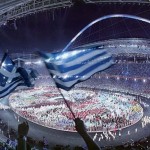 Olympic Games in Athens in August 2004
Olympic Games in Athens in August 2004
How the current Greek people and the Athenians look at their ancient sports that had staged a comback for the modern world?
Afew new books on this ancient sport and the Greek people who today is intolerant of outsiders! If there is a single day when the modern Olympic movement can be said to have taken root, it must be April 10th 1896, when a Greek farm boy, Spyridon Louis, won the marathon in the first Olympic Games of modern times. At about 5 o’clock in the afternoon, the sweat stained, dark haired young man, with no record of sporting prowess, came panting into the Athens stadium, a brand new replica of an ancient arena, after pounding 25 miles through his native Attica in just under three hours (The current length of the marathon -26 miles 385 yards – was not set until the games of 1908.)
The crowd that day went wild. Two princes of the Greek royal family ran down to join Louis on his final lap. Baron Pierre de Coubertin, the Frenchman who masterminded the revival of the ancient games, said the Louis victory was “one of the most extraordinary sights” of his life; it convinced him that “spiritual forces” have a role in sport.
For the baron, the marathon result was a vindication of his long struggle to prove that amateur sport, as practised in ancient Greece, could be an inspiration for humanity in all ages, and a force for peace. He also felt justified in his support of the modern Greek kingdom, a new polity struggling to live up to its glorious past, as the starting-point for his revival.
Olympics in Athens 1896: The Invention of the Modern Olympic Games. By Michael Llewellyn Smith. Profile Books ; 256 pages.
This Frenchman was underterred by his falling out with the Greeks and went on to organise games in Paris (in 1900) and St. Louis (in 1904) – which were not so successful. As it turned out, it was another contest in Athens (in 1906 but without the status of a fully fledged Olympics) that reconfirmed the games as a Greek-inspired, but peripatetic, sports event. Finally Greece and the baron made peace; in 1938 his heart was buried in ancient Olympia, the loveliest of all classical sites.
The Frenchman was not the first, nor the last, outsider to feel both the allure and the vindictive sting of a modern Greece that manages in an uncanny way to be much more, and much less, than the sum of its parts. It has never been hard to see the shortcomings, and at times the absurdities, of the neo-Hellenic project: the revival of classical glories in the shape of a smallish modern state whose people have by turns been inspired and depressed by their awesome heritage. Indeed, native Greek wits have excelled at satirising progonoplixia, ancestor worship. That past is often evoked in a prickly and defensive way by modern Greeks when their behaviour (individually or collectively) is at its least glorious. One account of Greece’s recent dealings with the Olympic movement, the 1967-74 military regime blithely promoted the “Olympic ideals” of classical times even as it crushed free speech and democracy!
A similar point is well made by Sofka Zinovieff in her witty and engaging account of life in Athens as the Anglo Russian spouse of a senior public servant. She had embraced Greece, and its language, as a student, but when she later moved back there, with her Greek husband and two daughters, she found much to dismay her-such as the rigid education system and the bigotry towards immigrants. However, she never lost her ability to be overwhelmed by small things – like the year old boy, a schoolmate of her daughters, who moves her deeply with songs full of atavistic yearning. At some points for example, in describing the funeral of her father -in-law, a teacher – the pitch of her narrative rises from that of personal memoir and catches something more elevated.
George Sarrinikolaou, a Greek-born journalist, is no less personal in his tale of rediscovering Athens. Having lived there until he was ten, he retains a keen eye for its flaws including its intolerance of outsiders, whose ranks he (by virtue of emigrating to America) is deemed to have joined. More harshly than Ms. Zinovieff, he portrays corrupt doctors, primitive male attitudes to women, and priests who rattle through their prayers. And he is not writing with a foreigner’s condescension; he is still insider endough to empathise with George Saferis, the poet who wrote that “wherever I travel, Greece wounds me”.
Between now and August, as the Athens Olympic Games refocus world attention on modern Greece, millions of outsiders will come face-to-face with that nation, with all is flaws and enchantments. Will they find it a prickly and defensive place, or an alluring one, full of mysterious surprises? Almost certainly, both.
Image Source : clproductions.gr